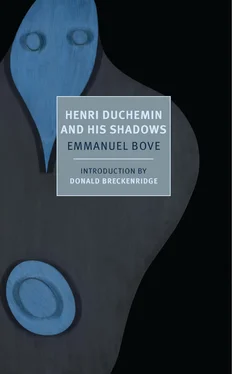At the time of Bove’s debut, Colette, André Gide, Philippe Soupault, Max Jacob, and Rainer Maria Rilke all adored his writing. Samuel Beckett was another early admirer who claimed, “Emmanuel Bove, more than anyone else...has an instinct for the essential detail.” Considering how obscure his work became after his death, it is hard to imagine Bove as a literary star, yet he was a successful and productive author in the 1920s and ’30s. While he avoided the spotlight that came with fame, his writing had a profound influence on many authors during his lifetime, and later on those writing after the Second World War. Bove informed Albert Camus’s humanistic preoccupations; Claude Simon’s elegant details and the obsessive autobiographical accounting that drive his novels; Nathalie Sarraute’s delicate and intimate precision; and the bleak humor and disparaging, otherworldly hopelessness of Beckett’s contributions to the theater of the absurd.
Bove’s German translator, the Austrian novelist Peter Handke, made known Bove’s reputation beyond France at a time when his novels were forgotten. The poet and translator John Ashbery has also been a passionate advocate. After more than fifty years of obscurity following his untimely death in the summer of 1945, Bove’s fiction has resurfaced in earnest and nurtured a younger generation of French novelists. His influence among writers in English has also begun to blossom—thanks in no small part to stellar translations by Dominic Di Bernardi ( A Singular Man , Quicksand ), Nathalie Favre-Gilly ( The Stepson , A Winter’s Journal ), Janet Louth ( My Friends , Armand , A Man Who Knows ), and now Alyson Waters, who has added another outstanding contribution to Bove’s work in English. Henri Duchemin and His Shadows collects many of his short stories and the novella Night Crime in one volume for the first time in English. This collection was originally published by Gallimard in 1939—just months before the outbreak of the Second World War.
Night Crime gloriously illustrates Bove’s ability to comfortably nest in the realms of the macabre with a delicate Kawabata-meets-Poe touch. In the richly nuanced and evocative dreamscape of the novella, we are introduced to the lonely and destitute Henri Duchemin on what can only be described as a singularly miserable Christmas Eve.
Henri Duchemin dreamed of supplicants, of owning houses, of freedom. But once his imagination had calmed down, it seemed the disorder of his room had grown, in contrast as it was with his reveries.
A mirror in a bamboo frame reflected his face. He forgot everything and, talking to himself, gazed at his reflection to see what he looked like when he spoke.
The flame was becoming so weak that now it lit only the table. It flickered on its wick. Suddenly it went out.
Henri Duchemin, groping for matches, knocked over objects he did not recognize.
Weary from searching, he sat in the armchair and closed his eyes so as not to see the darkness.
The warmth from his body was slowly drying his clothes. He felt better. Soon it seemed to him that the floor was slipping away beneath his feet and that his legs were swinging in the void, like those of a child on a chair.
We follow a dreaming Henri though Paris as he contemplates suicide and befriends a criminal who convinces him that murdering a banker will guarantee him a lifetime of wealth. After the murder, Henri flees into the night with the banker’s bulging wallet tearing apart the breast pocket of his threadbare overcoat and attempts to assuage his guilt by offering handfuls of francs to the strangers he encounters. When dawn finally breaks, Henri awakens to the realization of his innocence, and the story ends with a great relief that lasts only for as long as the final paragraph allows.
It was around this time that Bove left Suzanne and their two daughters without an explanation or even a farewell. As soon as his divorce was finalized, Bove married Louise Ottensooser, a young Jewish woman from a well-to-do family. Louise reintroduced him to the high society that he first had experienced while living with his stepmother, and he found himself completely alienated by it. At the same time his novels were growing longer and more nuanced, his writing having reached its full maturation, what was to be his peak, and he was able to live comfortably enough to write without having to worry about money.
Bove won the highly coveted Prix Figuière in 1928 for what many consider his finest work, La Coalition ( The Coalition ), which remains criminally untranslated. For the next few years, until the Great Depression nearly wiped out the Ottensooser family fortune, he was at his most content. Throughout the 1930s, Bove produced a steady output of writing that enabled him to provide for his mother, his second wife, and his ex-wife and daughters.
A staunch antifascist, Bove was revolted by Petain’s Vichy, and he courageously decided not to publish during the German occupation. Bove and Louise went underground and were eventually able to flee to Algiers in 1942, where he wrote his last masterpiece, Le Piege ( Quicksand ), and the novels Depart dans la nuit ( Night Departure ) and Non-lieu ( No Place ) while living among the exiled. All three books depict the paranoia and hopelessness of those living compromised lives during the German occupation. These three books were not written from the luxury of perspective and are all the more remarkable for their artistry and focus, penned in real time. When the Germans were pushed out of France in 1944, Bove and Louise were forced to linger in North Africa until they could scrape up enough funds to return to Paris. Bove was suffering from cachexia, a body-wasting disease, when his heart failed. He died in Paris on July 13, 1945, at age forty-seven.
—DONALD BRECKENRIDGE
* My Friends , translated by Janet Louth (Manchester: Carcanet Press, 1986).
HENRI DUCHEMIN AND HIS SHADOWS
It was Christmas Eve.
Henri Duchemin sat on a worn-out bench in a restaurant, waiting for the rain to stop. The holes in his trouser pockets and the long hair tickling his ears were constant reminders of his poverty.
Tired of sitting still, he was preparing to leave when he recalled the dark hallway of his house, the damp courtyard, the narrow stairway, and his unheated attic room.
He preferred the restaurant’s mild warmth to all that.
A few regulars were reading the evening papers. A draft caused the gas mantle’s slender chain to sway. The barmaid, elbows resting on the sideboard, wanted to go home.
Suddenly the customers raised their heads. A beggar had just walked in.
“He’s a hunchback,” one of them said.
The wind from the street nearly extinguished the gas lamp. Shadows fell from the ceiling along the walls.
“Close the door!”
The beggar obeyed and, hat in hand, moved forward, glancing furtively from right to left.
“What do you want?”
“A bit of charity.”
This beggar was like an actor who appears at last on an empty stage. The barmaid, torn between the pleasure of being entertained and that of chasing the poor wretch away, hung back for only a moment.
“Go on now, get out. There’s no begging in here.”
The customers took advantage of the incident to get to know one another. Although they did not all share the barmaid’s opinion, they had a vague sense they would end up approving of her action.
A sort of kinship developed from this, and they held forth for a long time on the subjects of begging, prostitution—on social problems, as they said drily.
Читать дальше












